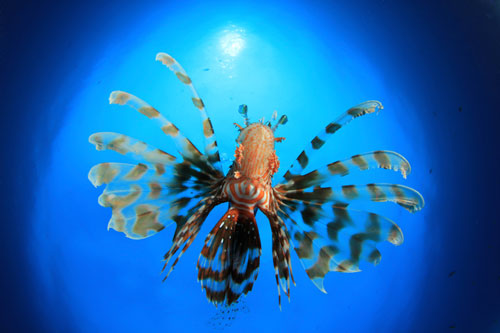On all but one of our five dive days at least one lion fish hunter was on the boat for the earliest dive. Akumal is, like much of the Caribbean, under invasion from these beautiful but voracious animals. In Akumal there is an organized effort to eradicate lion fish, and compared to our observations of this invasive species when we dove there a year earlier, the campaign is working. The population of lion fish is visibly down, though they are still quite prevalent. We noticed aboard in town where each hunter posts the location and number of animals they take each day. Based upon a review of the board, the hunters are taking a lot of lion fish. So anyway, we were along and watched two different hunters’ approach and attitude toward killing lion fish.

Hunter #1 was a local government official who dove once or twice a week. He used a short spear (as did the other) and he retained all of the fish taken in order to eat them or give them to someone else to eat. He sought out larger animals, and took two that were each over 12 inches long Once he had his two, he was done hunting and just enjoyed the rest of the dive.
Hunter #2 was a 60 – something American female who spends most of the year in Akumal, and has a home there. She had lost her husband to cancer within the past year of our meeting her, and she has made it her work to eradicate the lionfish as a “cancer” on her reef. Her approach to accomplishing this goal was to locate and kill as many animals as possible on her one dive each morning. Hunter #2 did not retain the fish she took.Rather, and this was a bit unsettling to watch, she more or less crushed them up with the end of a length of copper pipe, and left them where she dropped them.
I was interested to observe that the remains of the fish she killed were pretty well gone within a short time of her leaving the carcass. Some form of detritus eater is finding lion fish “McNuggets” palatable. Hunter # 2 was efficient and effective. On one dive we observed her to take 12 lionfish, though typically she killed six to eight on each dive. She also took fish of any size.
The first hunter justified his killing of the fish by eating them. The second hunter justified her killing of the fish as a good work of preserving the thousands of other fish that the lion fish would have eaten if she did not do something about it. While killing reef fish cuts against what I believe and teach, Debbie and I understand the importance of controlling this invasive species, and I have come to appreciate that an aggressive lionfish taking program can have a visible, and positive, impact on the reef environment. However, I still felt some sadness with each kill I observed. I remember how excited Debbie and I were to spot our first lion fish in Fiji more than 10 years ago. Now, at least in the Caribbean, we are excited when we see none. I find that to be a very strange turn of events.
For those of you who object to campaigns to kill lion fish, I respect you opinion. I am not sure what the correct solution to the lion fish problem is. I have not and do not intend to kill any. But on reflection, I find that I do not really object to those who do engage in lion fish eradication like our two hunters did. In fact, until a better solution is found, I am thankful for their efforts.
Divemaster Dennis

